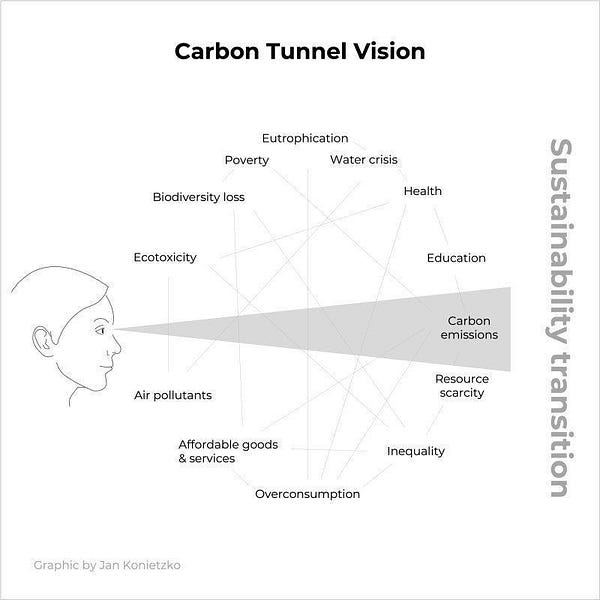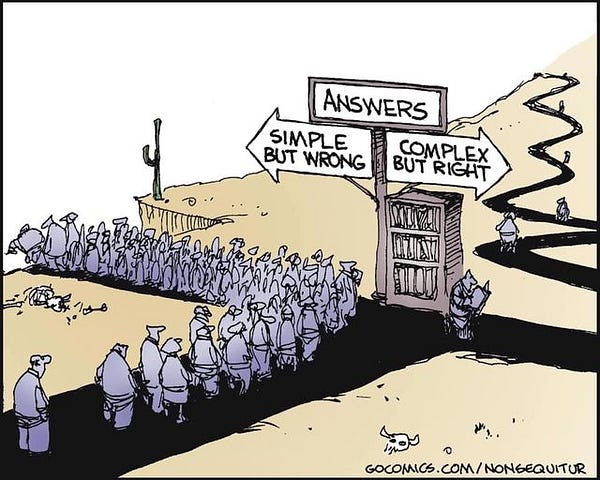Today’s Contemplation: Collapse Cometh LXV

Capitalism: One of Several Predicament Catalysts
Today’s contemplation is prompted by an article posted recently in a Degrowth Facebook group I am a member of. The author presents the argument that capitalism and the greed it inspires is the root of our inability to address climate change appropriately. While I don’t agree fully with the perspective presented, it is a great article that goes into much detail far beyond climate concerns and I recommend reading it.
Where I found myself reflecting on its content were the assertions that it is primarily, if not solely, the fault of capitalism for our existential crisis of climate change and the suggestion that it’s possible through degrowth strategies to achieve a utopian-like world with “…universal education and healthcare, and at least 5,000–15,000 km of mobility in various modes per person per year. It offers fairer and better lives for the vast majority of people…” (perhaps up to 10 billion) should the world have the wherewithal to ensure the ‘right’ things be done — particularly the idea that we need to avoid elite panic in responding to our crises (that leads to leveraging of situations to protect their ‘booty’) and adopt the non-elite tendency to ‘sacrifice’ for one’s community.
While I have great respect for the degrowth movement and its underlying philosophy that holds humanity needs to live within the biophysical limits of a finite planet[1], the bargaining/denial I sense from many that support it is where I diverge a tad in my thinking about our plight and future ‘potential’.
While I have come to the firm belief that our ruling elite are primarily driven by a desire to control/expand the wealth-generating/-extracting systems that provide their revenue streams and thus wealth/power/prestige/privilege (leading them to encourage/cheerlead the chasing of the perpetual growth chalice that supports the power/wealth structures inherent in any complex society, and certainly leverage crises to their advantage to help meet their motivation), I’m not so convinced that capitalism’s role in our predicament (ecological overshoot) is much more than a leverage-point (of several) in perhaps speeding up the pre/historical and biological/ecological processes which will eventually bring our global, industrial society to its knees.
Long before ‘capitalism’ took hold of our elite, there were complex societies that ‘collapsed’ due to what archaeologist Joseph Tainter argues are diminishing returns on investments in complexity[2]. Our human societies’ problem-solving proclivity to exploit/extract the easy-to-retrieve and cheap-to-access resources first leads to eventual ‘cost’ increases (particularly in terms of energy) that require the use of society’s surpluses/reserves to maintain/sustain political, economic, and organisational structures (as well as technologies) that serve as our ‘solutions’ to perceived ‘problems’.
Once these surpluses/reserves are unavailable due to their exhaustion and ‘society’ can no longer provide the benefits of participation in it, people ‘opt out’ and withdraw their support — usually by packing up and leaving. This ‘abandonment’ by increasing numbers of people undermines the necessary human, and thus material, inputs that support the structures that hold a complex society together and it eventually ‘collapses’.
Obviously, such a withdrawal of support is virtually impossible in today’s world for a variety of reasons; not least of which are the inability to ‘escape’ the elite’s reach in most nation states — at least for the time being — and a lack of skills/knowledge to survive for very long without the energy slaves/conveniences of ‘modern’ society, keeping people virtually trapped and incapable of opting out. In addition, the ruling elite need their citizens for labour and/or taxes and will go to virtually any length to prevent such withdrawal from the various entrapments of today’s world.
This is not to ignore the knock-on effects of ways in which ‘support’ is being undermined by political, social, and economic policies of the ruling elite. More and more people are questioning the directives issued from upon high and challenging them.
For example, there seems to be growing concern that the gargantuan expansion of credit/debt is quite problematic. For some this is an approach that expedites the drawing down of fundamental resources (especially energy) — ‘stealing from the future’ for lack of a better term. A good argument can also be made that much (most?) of this debt/credit is being created to fund geopolitical competition and siphon wealth from national treasuries into the ‘holdings’ of the elite. This is not to dismiss that a portion is being directed to the population, but I would contend that this is to help provide cover for the inequity that is resulting from the massive expansion of fiat currency — particularly in that ‘hidden tax’ of price inflation that always impacts the disadvantaged disproportionately to the wealthy elite — and to sustain the Ponzi scheme that our economic/financial/monetary systems have become.
I sense we are likely to experience (already are experiencing?) a doubling-down of efforts to control the hoi polloi by our ‘leaders’ as our systems begin to decline in perceived benefits. Tyranny comes in many guises, from narrative management and mass surveillance to incarceration and violence.
Our fundamental predicament is unfortunately overlooked in the somewhat reductionist approach that focuses exclusively on capitalism and climate change/carbon emissions. The following graphic illustrates this perspective with respect to the simplification that can occur when one focuses upon a single variable when complex systems necessarily consist of many intertwined ones with nonlinear feedback loops and emergent phenomena.

Eliminating capitalism has become the clarion call for many but I’m viewing this increasingly as part of the denial/bargaining that is expanding in our ‘hope’ to find a ‘solution’ to our various crises. In relatively simplistic terms, the view holds that if we eliminate the greed inherent in capitalism and the waste it leads to, humanity can continue to have a technological, global-spanning society where everyone can live happily-ever-after — for example, we could direct our ‘wealth’ to the ‘right’ technology (think ‘green/clean’ energy production and electrified gadgets) and thus sustain our complexities with nary a hiccup.
Unfortunately, I would argue, such rhetoric is not only dividing some very well-intentioned groups/individuals, but causing our fundamental predicament to be overlooked and thus any possible mitigation of it to be mostly dismissed — primarily because the issue is exceedingly complex and in all likelihood has no simple and all-encompassing ‘solution’, but rather a difficult and unnerving shift in thinking and approaches where perhaps just a handful of humans carry on in a ‘sustainable’ fashion[3].
This appears to be even worse than a ‘wicked problem’[4], for these still hold out ‘hope’ for a ‘solution’ should every variable line up ‘correctly’ to help ‘solve’ it. This possibility, as remote as it is for wicked problems, opens the door to all sorts of denial and bargaining — a strong human tendency to help avoid anxiety-provoking thoughts.
I’m increasingly leaning towards the conclusion that the ecological bottleneck our human experiment has created by its vast overshooting of the planet’s natural carrying capacity is far too small for the growing number of us to get through. No amount of denial or bargaining (elimination of capitalism; wealth redistribution; ‘green/clean’ energy) is likely to change that[5].
And then there’s the issue of peak resources, most problematic being that of oil. The ideas promulgated in the article and by supporters of degrowth seem to be somewhat energy/resource blind[6]. The significant (and I mean VERY significant) role played by oil and other fossil fuels in creating an explosion in human resource exploitation and population cannot be stressed enough. It has not only allowed us to access previously inaccessible resources to support our growth but has done so to the point where many of these supportive materials have now encountered significant diminishing returns and, for some, begun to encounter increasing scarcity placing continued use more in the rear-view mirror than some techno-cornucopian future[7].
I continue to believe that personal/group attempts to relocalise as much as possible the fundamentals of living can increase the probability of a region getting through to the other side of the coming transition. Potable water, food production, and shelter needs for the climate should be a focus; not bargaining with our sociopolitical and socioeconomic systems since this can unnecessarily divert energy and resources from the actions that will probably foster greater self-sufficiency and -resiliency — perhaps enough to get through the impending ecological bottleneck.
I believe we have never lived in an ideal world, nor ever will. The constant and repetitive rise and fall of complex societies has demonstrated our experimentations have failed, despite having the best technologies and thinkers of the time. We cannot help ourselves, it would seem. We keep making the same mistakes again and again and again…only this time we have leveraged a one-time cache of ancient carbon energy to create a globalised, industrial world and put the entire species into ecological overshoot while destroying many of any competing species and much of the planet in the process.
The likelihood of everything going ‘just right’ for us, as the ‘bargainers’ hope, is probably even more remote than this Canadian senior ending up playing in the National Hockey League (a childhood fantasy[8]) in the not too distant future.

This article was brought to my attention yesterday and is also well worth the read. It echoes many of my own thoughts about our plight.
[1] See: https://degrowth.info/degrowth
[2] Tainter, J.. The Collapse of Complex Societies. Cambridge University Press, 1988. (ISBN 978–0–521–38673–9). There are competing theories as to why and how complex societies decline/collapse, but I have found Tainter’s to be the most compelling.
[3] In no way am I advocating a sudden ‘die-off’ to achieve this; such an event is increasingly looking to happen via the ‘natural’ collapse that accompanies a species overshooting its environmental carrying capacity, regardless of our wishes otherwise.
[4] https://en.wikipedia.org/wiki/Wicked_problem
[5] I realise that stating ‘likely’ also opens the door to such bargaining but I attempt to be careful in declarations that suggest certitude. Few, if any, of our stories about our understanding of the world and prognostications about its future are certain — some just more probable than others.
[6] See Nate Hagens animated series: https://www.youtube.com/playlist?list=PLdc087VsWiC7xAS3YTykoRRi1gmNtGZVG
[7] See the work of Geological Survey of Finland’s Simon Michaux, especially:
[8] As a Canadian born at the start of the 1960s in a relatively smallish city (182,000 the year I was born), I was introduced to playing hockey at age four. I have played almost every year since (took a few years off when my children were young) and continue to play regularly. I have played alongside some who have been drafted by NHL teams but never made the next step, and I can attest to the fact that despite my wishes my skill set has never been even close to being capable of playing professionally. I am still struggling to pull off a ‘saucer pass’ or ‘toe drag’ regularly and continue to practise them almost every time I play.